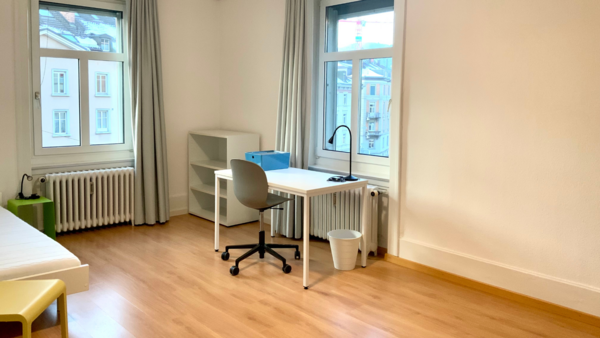![[Translate to english:] [Translate to english:]](/fileadmin/_processed_/5/8/csm_Jahresveranstaltung_Hochschulbildung_01_bea605eede.png)
Swiss Programme for Erasmus+
The Swiss Programme for Erasmus+ is the programme for international educational cooperation that supplements the European Union's Erasmus+ Programme. It supports exchange and cooperation between Switzerland and Erasmus+ countries and will even support mobility projects worldwide in 2023.
Swiss Programme for Erasmus+
Erasmus+ is the European Union’s programme for education, youth and sports and is one of the world’s largest funding instruments for foreign exchange and institutional cooperation. The current programme generation is being implemented from 2021-2027. What began in 1987 as a mobility programme for students has since enriched the lives of more than 10 million participants and indirectly influenced the lives of countless others. Exchange, mobility and cooperation allow participants to have formative experiences.
Switzerland is no longer an Erasmus+ programme country, but rather has been a partner country since 2014. In order for Swiss institutions to be able to continue working together with Erasmus+ programme countries, the Swiss Federal Council has adopted a solution that is financed by the Swiss government. This Swiss Programme for Erasmus+ promotes cooperation between individuals and institutions from Switzerland and Erasmus+ programme countries. To ensure reciprocity, the programme also financially supports individuals from Erasmus+ countries who stay in Switzerland (incoming mobility). From 2023 onwards, stays abroad will also be supported worldwide.
Like Erasmus+, the Swiss Programme for Erasmus+ also provides participants with the skills that they will need to live independent, fulfilling lives, helps them to find their place in society, and helps them to develop a sense of cosmopolitan identity in addition to national, regional and local identities. Participants’ experiences abroad and the institutional partnerships also strengthen Switzerland’s position as a centre of education and increases its competitiveness
Educational levels
ERASMUS, which is often referred to as a ‘student exchange programme’, was initially solely limited to university students. Things are different today: Since 2014, Erasmus+ has included opportunities for the individuals at the primary and secondary schools, vocational education and training, tertiary education, and adult education levels, as well as individuals involved in extracurricular youth work. The same applies to the Swiss Programme for Erasmus+ (except for early childhood education).
Mobility and cooperation
The Swiss Programme for Erasmus+ supports mobility projects as well as institutional cooperation within the framework of Erasmus+ cooperation projects (Key Action 2).
In terms of funding for learning mobility, the Swiss Programme for Erasmus+ funds studies abroad, teaching activities, internships and work experiences, volunteer work, and group and individual youth exchanges worldwide. We have included links to detailed information on the conditions for participating in learning mobilities.
Swiss institutions can still participate in certain Erasmus+ cooperation projects. Cooperation funding within the Swiss Programme for Erasmus+ focuses on institutional cooperation between educational institutions, public authorities, social partners or youth organisations, within the framework of Erasmus+ projects. You can find more information in the links.
Erasmus+: More than 30 European countries
More than 30 European countries are participating in Erasmus+ 2021–2027: All 27 EU Member States as well as the EFTA-EEA states Norway, Iceland and Liechtenstein and the three official EU candidates Turkey, Northern Macedonia and Serbia.
Since 2014, Switzerland is no longer an Erasmus+ programme country, but rather just a partner country. Association with the EU's Erasmus+ funding programme remains an objective of the Swiss Federal Council.
![[Translate to english:] [Translate to english:]](/fileadmin/_processed_/0/2/csm_COIL_Foto_Praxis_und_Wissen_f9afa8ef05.jpg)

![[Translate to english:] [Translate to english:]](/fileadmin/_processed_/8/0/csm_Semp_Space_065ec993af.jpg)